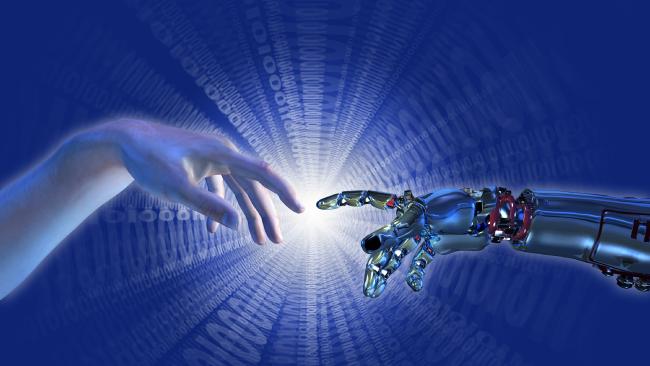AI will continue to change the way we work, building on the technology and skills we’re already using. As experts continue to research and debate the power and role of artificial intelligence, public discourse swirls more around risk than reward.
copyright by www.theaustralian.com.au
 However, the notion of AI completely replacing the work of humans is a long way off in most real-world cases. If we can approach AI as assistive intelligence and seize opportunities to enhance, rather than replace, our skills, humans will reap the benefits of this smart technology. Applications of AI have the ability to empower workers and increase efficiencies across industries. A recent study from AlphaBeta commissioned by Google argues that machines will “unburden the average Australian of two hours of the most tedious and manual work a week over the next 15 years”.
However, the notion of AI completely replacing the work of humans is a long way off in most real-world cases. If we can approach AI as assistive intelligence and seize opportunities to enhance, rather than replace, our skills, humans will reap the benefits of this smart technology. Applications of AI have the ability to empower workers and increase efficiencies across industries. A recent study from AlphaBeta commissioned by Google argues that machines will “unburden the average Australian of two hours of the most tedious and manual work a week over the next 15 years”.
A boost for the Australian economy
The report also showed the Australian economy could be $2.2 trillion better off by 2030 due to dramatic efficiency improvements across key industry sectors. Yet the advantages of AI are not exclusive to corporations. Benefits will also be felt at the individual level as employees in a variety of positions are freed from many menial, repetitive tasks and find themselves enabled to work more strategically, exploring new ways to expand their roles. AI will continue to change the way we work, building on the technology and skills we’re already using: automating manual and labour-intensive tasks, and allowing more time for higher level thinking, creativity and collaboration. Used in this way, organisations will gain real business value from employees by capitalising on their uniquely human skills. AI complements human intelligence — enabling workers to focus on tasks that require insights and experience beyond what can be built into an algorithm.
From specific tasks to broader applications
AI in its current state augments a specific task, particularly when it comes to dealing with large amounts of data and information. Though we are still in the early days of the broad use of this technology, there are excellent examples across a number of industries that attest to its efficiency and success when used in this way. The ability to work with data is already one of the most in-demand skills across the corporate world. While machine learning backed algorithms help people access and analyse relevant data faster, AI is no replacement for the power of human intuition. It’s people who are uniquely qualified to ask meaningful questions based on context machines do not have, and tie those answers back to business problems. While AI can find unexpected outliers and identify patterns within the data, human analysis plays a vital role in generating useful insights. People must ensure that the encoded assumptions made by algorithms are reasonable, as well as determine what to actually do with the results found on the screen. […]
read more – copyright by www.theaustralian.com.au


AI will continue to change the way we work, building on the technology and skills we’re already using. As experts continue to research and debate the power and role of artificial intelligence, public discourse swirls more around risk than reward.
copyright by www.theaustralian.com.au
A boost for the Australian economy
The report also showed the Australian economy could be $2.2 trillion better off by 2030 due to dramatic efficiency improvements across key industry sectors. Yet the advantages of AI are not exclusive to corporations. Benefits will also be felt at the individual level as employees in a variety of positions are freed from many menial, repetitive tasks and find themselves enabled to work more strategically, exploring new ways to expand their roles. AI will continue to change the way we work, building on the technology and skills we’re already using: automating manual and labour-intensive tasks, and allowing more time for higher level thinking, creativity and collaboration. Used in this way, organisations will gain real business value from employees by capitalising on their uniquely human skills. AI complements human intelligence — enabling workers to focus on tasks that require insights and experience beyond what can be built into an algorithm.
From specific tasks to broader applications
AI in its current state augments a specific task, particularly when it comes to dealing with large amounts of data and information. Though we are still in the early days of the broad use of this technology, there are excellent examples across a number of industries that attest to its efficiency and success when used in this way. The ability to work with data is already one of the most in-demand skills across the corporate world. While machine learning backed algorithms help people access and analyse relevant data faster, AI is no replacement for the power of human intuition. It’s people who are uniquely qualified to ask meaningful questions based on context machines do not have, and tie those answers back to business problems. While AI can find unexpected outliers and identify patterns within the data, human analysis plays a vital role in generating useful insights. People must ensure that the encoded assumptions made by algorithms are reasonable, as well as determine what to actually do with the results found on the screen. […]
read more – copyright by www.theaustralian.com.au
Share this: